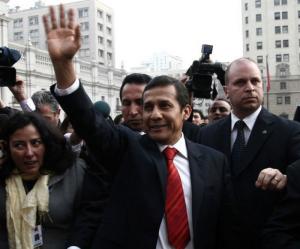
(above) Peruvian President Ollanta Humala (UPI/Israel Chávez)
Humala on risky road to battle corruption in Peru
October 13, 2011 - UPI
LIMA, Oct. 13 (UPI) -- Peruvian President Ollanta Humala has embarked on a politically hazardous course to fight deep-rooted corruption in government and security forces, winning about as many enemies as friends.
High-level corruption has blighted Peruvian politics and security infrastructures for many years, as reflected in the first wave of Humala's purges, which led to the removal of 30 of the 55 generals in the police force.
More purges are predicted by analysts but the president also faces increasing dangers from entrenched and powerful interest groups that have thrived on corruption and must now see their contraband or outwardly innocuous businesses challenged by the government crackdown.
A widely publicized police operation last week freed about 300 women said to be held as sex slaves in the country's Amazon region. But the widely reported rescue raised searching questions about what took the police so long to close about 50 brothels that were widely known to operate with relative impunity.
In September the Save the Children charity identified more than 1,100 underage girls believed to be used as sex workers in just one state -- the Madre de Dios in Peru's southeast.
Analysts said organized prostitution was only a minor part of the corruption chain that involves drugs, illegal trade practices and influence peddling in politics and government.
Peru is considered the world's second biggest producer of cocaine after Colombia. The area under coca cultivation in Peru has been growing steadily, U.N. agencies say, indicating the rising power of organized crime in the country's infrastructure.
Humala vowed to clean up Peruvian politics and society when he took over as president on July 28. He has outlined plans to achieve a more equitable distribution of income from the country's exports of natural resources but in seeking those goals he faces a vast array of enemies among entrenched interest groups.
Earlier this year Humala indicated a strategic shift from hard left to center-left politics to reassure Peruvian and foreign investors and promote the idea of Peru as an emergent market economy.
The fight against corruption was also a response to international criticism of Peru, seen by analysts as a precursor to another campaign to try and contain cocaine trafficking.
Raul Salazar, newly appointed head of the national police, said fighting drug trafficking would remain a priority and outlined zero tolerance for corruption "from the most minimal to the most important."
The dismissals among senior police ranks were cited by senior officials as part of a government effort to streamline the police force, often described as bloated. In addition to 55 generals, the police force has 900 colonels and more than 2,000 commanders.